201516学年配套中学教材全解九年级下英语(人教)UUNIT10You’resupposedtoshakehands检测题
- 格式:doc
- 大小:83.50 KB
- 文档页数:10
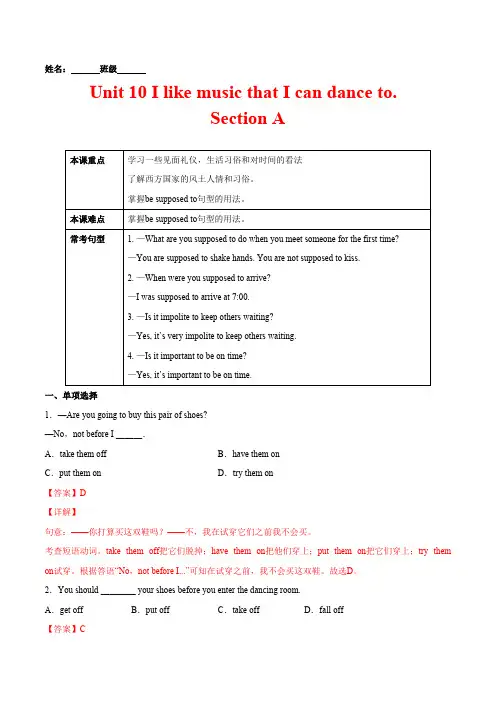
姓名:班级Unit 10 I like music that I can dance to.Section A本课重点学习一些见面礼仪,生活习俗和对时间的看法了解西方国家的风土人情和习俗。
掌握be supposed to句型的用法。
本课难点掌握be supposed to句型的用法。
常考句型 1. —What are you supposed to do when you meet someone for the first time?—You are supposed to shake hands. You are not supposed to kiss.2. —When were you supposed to arrive?—I was supposed to arrive at 7:00.3. —Is it impolite to keep others waiting?—Yes, it’s very impolite to keep others waiting.4. —Is it important to be on time?—Yes, it’s important to be on time.一、单项选择1.—Are you going to buy this pair of shoes?—No,not before I ______.A.take them off B.have them onC.put them on D.try them on【答案】D【详解】句意:——你打算买这双鞋吗?——不,我在试穿它们之前我不会买。
考查短语动词。
take them off把它们脱掉;have them on把他们穿上;put them on把它们穿上;try them on试穿。
根据答语“No,not before I...”可知在试穿之前,我不会买这双鞋。
故选D。
2.You should ________ your shoes before you enter the dancing room.A.get off B.put off C.take off D.fall off【答案】C【详解】句意:在进入舞蹈房之前,你应该脱掉鞋子。
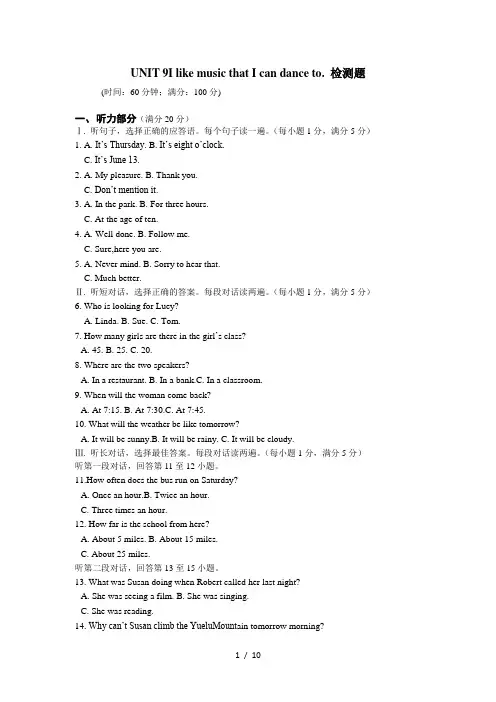
UNIT 9I like music that I can dance to. 检测题(时间:60分钟;满分:100分)一、听力部分(满分20分)Ⅰ. 听句子,选择正确的应答语。
每个句子读一遍。
(每小题1分,满分5分)1. A. It’s Thursday. B. It’s eight o’clock.C. It’s June 13.2. A. My pleasure. B. Thank you.C. Don’t mention it.3. A. In the park. B. For three hours.C. At the age of ten.4. A. Well done. B. Follow me.C. Sure,here you are.5. A. Never mind. B. Sorry to hear that.C. Much better.Ⅱ. 听短对话,选择正确的答案。
每段对话读两遍。
(每小题1分,满分5分)6. Who is looking for Lucy?A. Linda.B. Sue.C. Tom.7. How many girls are there in the girl’s class?A. 45.B. 25.C. 20.8. Where are the two speakers?A. In a restaurant.B. In a bank.C. In a classroom.9. When will the woman come back?A. At 7:15.B. At 7:30.C. At 7:45.10. What will the weather be like tomorrow?A. It will be sunny.B. It will be rainy.C. It will be cloudy.Ⅲ. 听长对话,选择最佳答案。
每段对话读两遍。
(每小题1分,满分5分)听第一段对话,回答第11至12小题。
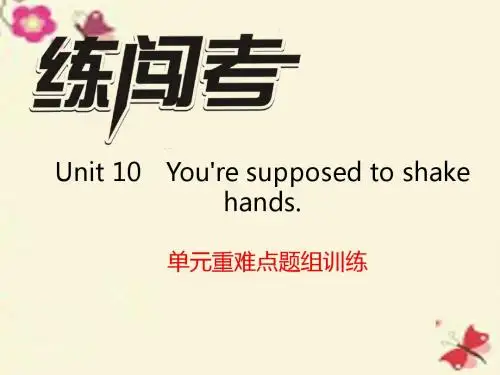

Unit10 You’re supposed to shank hands。
1.custom(n)风俗customer(n)顾客2.greet sb问候某人greet each other向彼此打招呼greet gusts 迎接客人3.relaxed(adj)放松的(修饰人) relaxing(adj)令人放松的(修饰物)(注意区别)4.value(v)重视(过去式:valued 过去分词:valued -ing:valuing)value sth重视某物value the time珍惜时间(n)价值the value of ...的价值5.drop by顺便拜访drop by+某人/某地拜访某人/某物drop in on sb顺便拜访某人drop in at+地点顺便拜访某地6.capital(n)首都the capital of ...的首都7.after all毕竟(注意:可放句首、句中、句末)8.get mad生气be/get mad at /with sb生某人的气be/get mad about sth因某事生气(注意:等同于angry)9.make an effort to do sth =try to do sth 尽力做某事10.clean...off...把...擦掉clean sth off擦掉某物clean it off擦掉它(注意:代词放中间,名词放中间或后面)clean up打扫干净do some cleaning打算工作11.east(n)东方west(n)西方south(n)南方north(n)北方eastern(adj)东方的western(adj)西方的southern(adj)南方的northern(adj)北方的(注意区别东西南北)12.knock on/at the door敲门knock into与...相撞knock down 撞倒13.take off起飞、脱下反义:land 着陆put on穿上14.worth(adj)有价值的be well worth doing sth值得做某事be worth+钱值钱be worth+名词值得15.manners礼貌table manners餐桌礼仪manner方式in a friendly manner以友好的方式(注意:礼仪用matters,方式用matter)16.exchange(n/v)交换an exchange student一名交换生in exchange for交换exchange A for B用A交换B17.go out of one’s way格外努力go out of one’s way to do sth竭力做某事18.make sb feel at home使某人感到宾至如归make sb do sth让某人做某事19.behave well/badly 表现得好/坏(v)behavior(n)表现20.except除...之外(后面的成分不包括在内)besides除...之外(后面的成分包括在内)but除了(句中有no one、nobody、nothing、all、everyone、everything)except for除...之外(说明情况后加以改正)(注意区别)21.be/get used to doing sth习惯做某事used to do sth过去经常做某事be used to do sth/be used for doing sth被用来做某事22.be supposed top do sth=be expected to do sth=should do sth 应该做某事23.for the first time第一次24.shake hands握手(过去式:shook 过去分词:shaken)25.foreign(adj)外国的foreigner(外国人)26.make friend with sb与某人交朋友make mistakes in在...犯错误27.as soon as一...就(注意:主句用将来时,从句用现在时;主句用过去时,从句用过去时)28.hold out one’s hand伸出某人的手29.it is+adj+to do sth做某事是什么样的30.return sth to sb=give sth back to sb把某物还给某人31.on both sides of the street=on either side of the street=on each side of the street在街的两边32.expect sth期待某事except to do sth期待去做某事expect sb to do sth期待去做某事expect sb to do sth期待某人去做某事expect+that从句be expected to do sth被期待去做某事33.to one’s surprise使某人惊讶的是in surprise惊讶地be surprised at对...感到惊讶be surprised to do sth做某事感到惊讶34.walk around散步35.avoid sth避免某事avoid doing sth避免做某事36.keep others waiting让某人等keep sb doing sth让某人一直做某事37.plan to do sth=make a plan to do sth计划做某事38.arrive in+大地点=arrive at+小地点=reach=get to到达39.point out指出point at近指point to远指40.thanks for doing sth=thank sb to do sth谢谢某人做某事41.mind小心(注意:后加名词、代词、动词ing)42.sb have/has(no)reason to do sth 某人(没)有理由做某事=there is(no)reason for sb to do sth43.about one’s age同某人的年龄差不多by one’s age在某人这个年龄find it+adj+to do sth发现做某事是怎样的(注意:think、believe、know、feel也用此用法)。
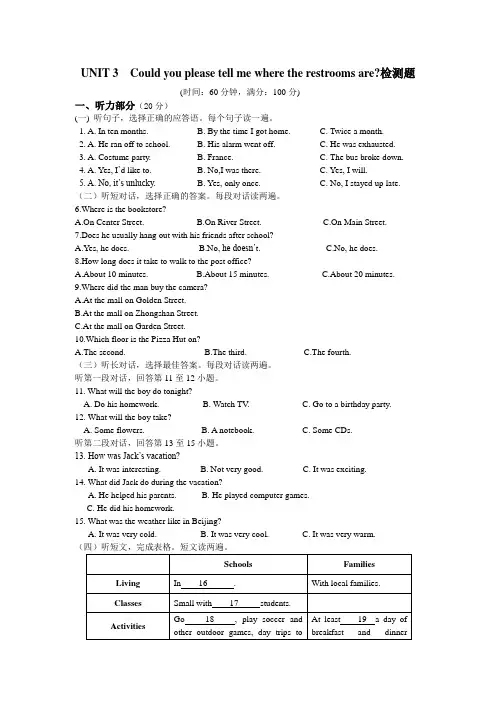
UNIT 3 Could you please tell me where the restrooms are?检测题(时间:60分钟,满分:100分)一、听力部分(20分)(一)听句子,选择正确的应答语。
每个句子读一遍。
1. A. In ten months. B. By the time I got home. C. Twice a month.2. A. He ran off to school. B. His alarm went off. C. He was exhausted.3. A. Costume party. B. France. C. The bus broke down.4. A. Yes, I’d like to. B. No,I was there. C. Yes, I will.5. A. No, it’s unlucky. B. Yes, only once. C. No, I stayed up late. (二)听短对话,选择正确的答案。
每段对话读两遍。
6.Where is the bookstore?A.On Center Street.B.On River Street.C.On Main Street.7.Does he usually hang out with his friends after school?A.Yes, he does.B.No, he doesn’t.C.No, he does.8.How long does it take to walk to the post office?A.About 10 minutes.B.About 15 minutes.C.About 20 minutes.9.Where did the man buy the camera?A.At the mall on Golden Street.B.At the mall on Zhongshan Street.C.At the mall on Garden Street.10.Which floor is the Pizza Hut on?A.The second.B.The third.C.The fourth.(三)听长对话,选择最佳答案。
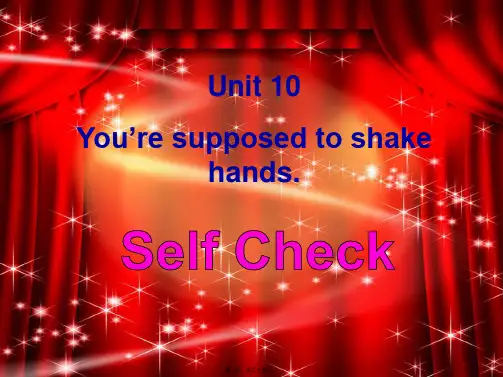
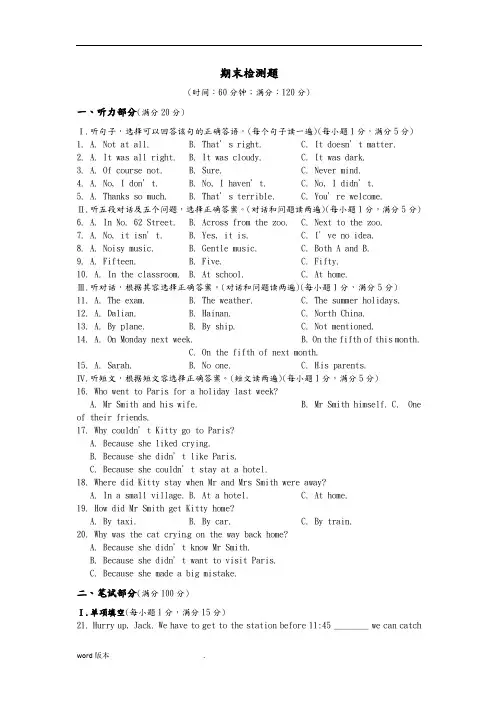
期末检测题(时间:60分钟;满分:120分)一、听力部分(满分20分)Ⅰ.听句子,选择可以回答该句的正确答语。
(每个句子读一遍)(每小题1分,满分5分)1. A. Not at all. B. That’s right. C. It doesn’t matter.2. A. It was all right. B. It was cloudy. C. It was dark.3. A. Of course not. B. Sure. C. Never mind.4. A. No, I don’t. B. No, I haven’t. C. No, I didn’t.5. A. Thanks so much. B. That’s terrible. C. You’re welcome.Ⅱ.听五段对话及五个问题,选择正确答案。
(对话和问题读两遍)(每小题1分,满分5分)6. A. In No. 62 Street. B. Across from the zoo. C. Next to the zoo.7. A. No, it isn’t. B. Yes, it is. C. I’ve no idea.8. A. Noisy music. B. Gentle music. C. Both A and B.9. A. Fifteen. B. Five. C. Fifty.10. A. In the classroom. B. At school. C. At home.Ⅲ.听对话,根据其容选择正确答案。
(对话和问题读两遍)(每小题1分,满分5分)11. A. The exam. B. The weather. C. The summer holidays.12. A. Dalian. B. Hainan. C. North China.13. A. By plane. B. By ship. C. Not mentioned.14. A. On Monday next week. B. On the fifth of this month.C. On the fifth of next month.15. A. Sarah. B. No one. C. H is parents.Ⅳ.听短文,根据短文容选择正确答案。
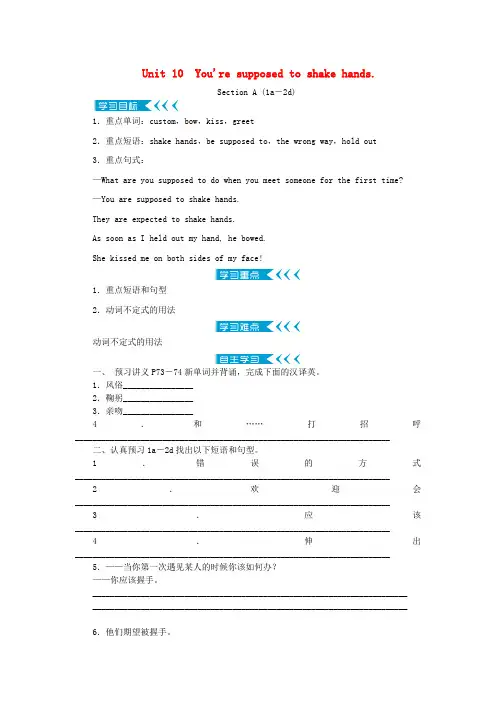
Unit 10 You're supposed to shake hands.Section A (1a-2d)1.重点单词:custom,bow,kiss,greet2.重点短语:shake hands,be supposed to,the wrong way,hold out3.重点句式:—What are you supposed to do when you meet someone for the first time?—You are supposed to shake hands.They are expected to shake hands.As soon as I held out my hand, he bowed.She kissed me on both sides of my face!1.重点短语和句型2.动词不定式的用法动词不定式的用法一、预习讲义P73-74新单词并背诵,完成下面的汉译英。
1.风俗________________2.鞠躬________________3.亲吻________________4.和……打招呼________________________________________________________________________二、认真预习1a-2d找出以下短语和句型。
1.错误的方式________________________________________________________________________ 2.欢迎会________________________________________________________________________ 3.应该________________________________________________________________________ 4.伸出________________________________________________________________________ 5.——当你第一次遇见某人的时候你该如何办?——你应该握手。
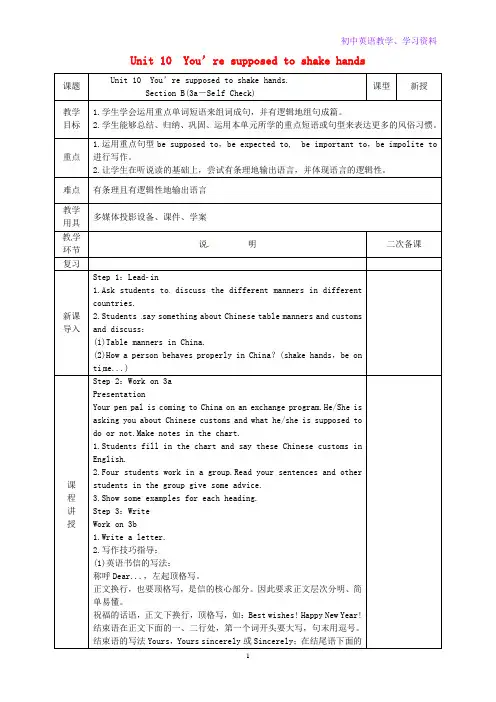
Unit 10 You’re supposed to shake hands课题Unit 10 You’re supposed to shake hands.Section B(3a-Se lf Check)课型新授教学目标1.学生学会运用重点单词短语来组词成句,并有逻辑地组句成篇。
2.学生能够总结、归纳、巩固、运用本单元所学的重点短语或句型来表达更多的风俗习惯。
重点1.运用重点句型be supposed to,be expected to, be important to,be impolite to 进行写作。
2.让学生在听说读的基础上,尝试有条理地输出语言,并体现语言的逻辑性。
难点有条理且有逻辑性地输出语言教学用具多媒体投影设备、课件、学案教学环节说明二次备课复习新课导入Step 1:Leadin1.Ask students to discuss the different manners in different countries.2.Students say something about Chinese table manners and customs and discuss:(1)Table manners in China.(2)How a person behaves properly in China?(shake hands,be on ti me...)课程讲授Step 2:Work on 3aPresentationYour pen pal is coming to China on an exchange program.He/She is asking you about Chinese customs and what he/she is supposed to do or not.Make notes in the chart.1.Students fill in the chart and say these Chinese customs in English.2.Four students work in a group.Read your sentences and other students in the group give some advice.3.Show some examples for each heading.Step 3:WriteWork on 3b1.Write a letter.2.写作技巧指导:(1)英语书信的写法:称呼Dear...,左起顶格写。
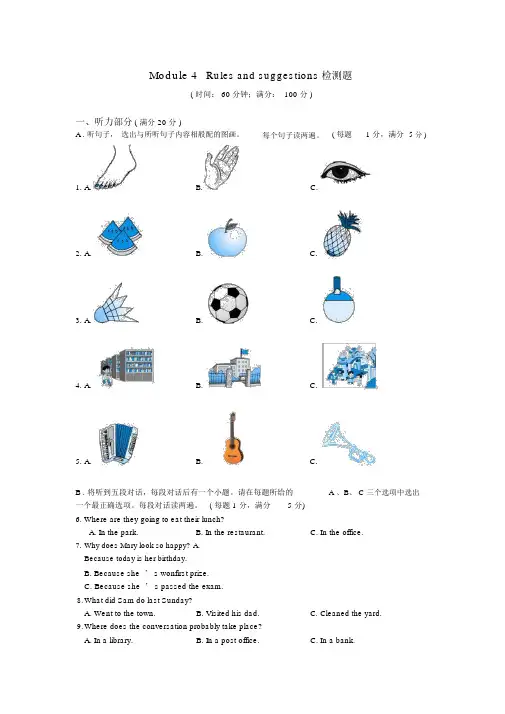
Module 4Rules and suggestions检测题( 时间: 60 分钟;满分: 100 分 )一、听力部分 ( 满分 20 分 )A . 听句子,选出与所听句子内容相般配的图画。
1. A. B. 每个句子读两遍。
C.( 每题 1 分,满分 5 分 )2. A. B. C.3. A. B. C.4. A. B. C.5. A. B. C.B . 将听到五段对话,每段对话后有一个小题。
请在每题所给的一个最正确选项。
每段对话读两遍。
( 每题 1 分,满分 5 分)6. Where are they going to eat their lunch?A. In the park.B. In the restaurant.A 、B、 C 三个选项中选出C. In the office.7.Why does Mary look so happy? A.Because today is her birthday.B. Because she ’ s wonfirst prize.C. Because she ’ s passed the exam.8. What did Sam do last Sunday?A. Went to the town.B. Visited his dad.C. Cleaned the yard.9. Where does the conversation probably take place?A. In a library.B. In a post office.C. In a bank.10.What does the man mean?A.He likes going for a picnic in autumn.B.He won ’ t gofor a picnic in bad weather.C.He wants to go for a picnic with the woman.C. 听独白,从 A、B 、C 三个选项中选择吻合独白内容的选项,回答以下问题。
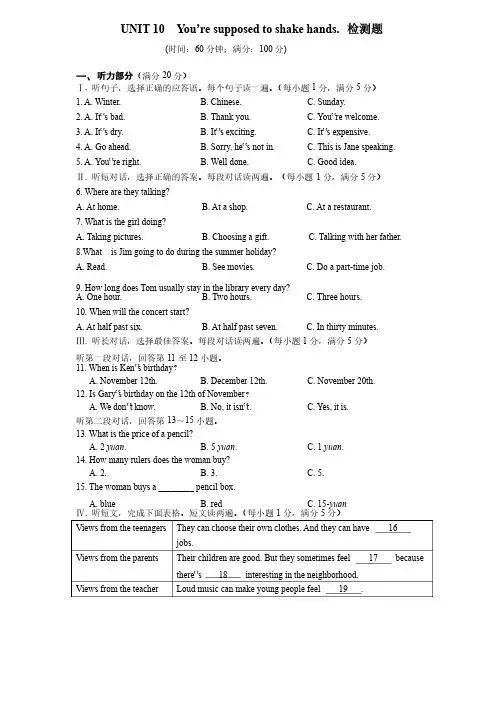
UNIT 10 You’re supposed to shake hands. 检测题(时间:60分钟;满分:100分)一、 听力部分(满分20分)分) Ⅰ. 听句子,选择正确的应答语。
每个句子读一遍。
(每小题1分,满分5分)分)1. A. Winter. B. Chinese. C. Sunday.2. A. It‟s bad. B. Thank you.C. You‟re welcom C. You‟re welcome. e. 3. A. It‟s dry. B. It‟s exciting. C. It‟s expensive.4. A. Go ahead. B. Sorry, he‟s not in. C. This is Jane speaking.5. A. You‟re right. B. Well done. C. Good idea.Ⅱ. 听短对话,选择正确的答案。
每段对话读两遍。
(每小题1分,满分5分)分)6. Where are they talking?A. At home.B. At a shop.C. At a restaurant. 7. What is the girl doing?A. Taking pictures.B. Choosing a gift.C. Talking with her father. 8.What is Jim going to do during the summer holiday? A. Read. B. See movies. C. Do a part-time job.9. How long does Tom usually stay in the library every day? A. One hour. B. Two hours. C. Three hours.10. When will the concert start? A. At half past six.B. At half past seven.C. In thirty minutes. Ⅲ. 听长对话,选择最佳答案。
UNIT 9
Section A
2a Listen and T for true or F for false. Xu Fei: Look, Carmen. These T-shirts are great! Look
movie, but it was so sad that it made us cry.
John: Sad movies don ’t make me cry. They just make
me want to leave!
Tina: You sound just like my brother!
Section B
它是一部非常好的电影,但它很伤感,使我们哭了。
约翰:悲伤的电影不会使我哭泣。
它们只会使我想离开! 蒂娜:你听起来就像我的哥哥!
UNIT 13 Section A
Section A
1b Listen and match the memory with the person.
Mary: Hey, Frank! Peter, Sarah and I were just sharing memories of junior high school. Frank: Great! Do you have any special memories, Mary?
Mary: Oh yeah, lots…I remember losing my schoolbag in Grade 7. 听录音,将记忆与人物相匹配。
玛丽:嗨,弗兰克!彼得、萨拉和我正在分享初中的一些记忆。
弗兰克:太棒了!你有一些特别的
记忆吗,玛丽?
玛丽:哦,是的,很多……我记得在七年级时我丢了我的书包。
UNIT10You’re supposed to shake hands. 检测题(时间:60分钟;满分:100分)一、听力部分(满分20分)Ⅰ. 听句子,选择正确的应答语。
每个句子读一遍。
(每小题1分,满分5分)1. A. Winter. B. Chinese. C. Sunday.2. A. It’s bad. B. Thank you. C. You’re welcome.3. A. It’s dry. B. It’s exciting. C. It’s expensive.4. A. Go ahead. B. Sorry, he’s not in. C. This is Jane speaking.5. A. You’re right. B. Well done. C. Good idea.Ⅱ. 听短对话,选择正确的答案。
每段对话读两遍。
(每小题1分,满分5分)6. Where are they talking?A. At home.B. At a shop.C. At a restaurant.7. What is the girl doing?A. Taking pictures.B. Choosing a gift.C. Talking with her father.8.What is Jim going to do during the summer holiday?A. Read.B. See movies.C. Do a part-time job.9. How long does Tom usually stay in the library every day?A. One hour.B. Two hours.C. Three hours.10. When will the concert start?A. At half past six.B. At half past seven.C. In thirty minutes.Ⅲ. 听长对话,选择最佳答案。
每段对话读两遍。
(每小题1分,满分5分)听第一段对话,回答第11至12小题。
11. When is Ken’s birthday?A. November 12th.B. December 12th.C. November 20th.12. Is Gary’s birthday on the 12th of November?A. We don’t know.B. No, it isn’t.C. Yes, it is.听第二段对话,回答第13~15小题。
13. What is the price of a pencil?A. 2 yuan.B. 5 yuan.C. 1 yuan.14. How many rulers does the woman buy?A. 2.B. 3.C. 5.15. The woman buys a ________ pencil box.A. blueB. redC. 15-yuanⅣ. 听短文,完成下面表格。
短文读两遍。
(每小题1分,满分5分)二、笔试部分(满分80分)Ⅰ. 单项填空(每小题1分,满分15分)21. You ______ arrive at six am,but you arrived at seven last Sunday.A. supposed toB. were supposed toC. are supposed toD. were supposed22. —Is your friend Michael still in Australia?—I don’t know. I have information about him because we haven’t seen each other for years.A. a little。
a fewB. little。
a fewC. a few。
a littleD. few。
a little23. —What do you usually do in the morning?—I often practice English.A. speakB. to speakC. speakingD.spoken24.The book is well worth . I plan one.A. read。
to buyB. reading。
buyingC. reading。
to buyD.to read。
buying25. It’s very hot here. Why not your coat?A. put onB. try onC. take offD. turn off26. Listening to the music always makes me .A. relaxed。
relaxingB. relaxed。
relaxedC. relaxing。
relaxingD. relaxing。
relaxed27. Animals are our close friends. We are supposed them.A. to protectB. protectingC. protectD.protected28. —All the workers went home yesterday Mr. White. Why?—Because he was on duty.A. exceptB. besidesC. except forD. beside29. As we know,it’s not polite to keep others for a long time.A. waitB. waitedC. to waitD. waiting30. Thank you forme.A. inviteB. invitingC. invitedD. invites31.the teacher, I’ve made great progress in English.A. Thank youB. Thanks forC. Thanks toD. Thanks you32. Students should learn how problems.A. solveB. solvingC. can solveD. to solve33. —Why are you so excited?—Peter invited me on a trip to Yuntai Mountain.A. to goB. goC. goingD. went34. I find difficult to work with her.A. herB. meC. thatD. it35. The Greens used to live in London and now they in Beijing.A. used to liveB. are used to liveC. are used to livingD. are used for livingⅡ. 完形填空(每小题1分, 满分10分)Chinese eating habits are different from those in Western countries. In the West,everyone has his or her own 36of food. But in China the dishes are 37 on the table and everyone shares. If you are being treated by a Chinese host,there must be 38 food prepared for you. Chinese are very 39 of their culture and will do their best to show their hospitality(好客).And sometimes the Chinese hosts use their 40 to put food in your bowl or plate. This is a sign of politeness. The proper thing to do would be eat the whatever-it-is and say how 41 it is. If you feel uncomfortable with this,you can just say “thanks”and leave the food there. Don’t 42 your chopsticks upright into the rice bowl. Instead,lay them on your dish. The reason for this is that when somebody 43,the shrine (圣殿)to him has a bowl of sand or rice with two chopsticks which are stuck upright in it. It is impolite to set the teapot down where the spout (壶嘴)is facing 44 somebody. The spout should always be directed to where nobody is sitting,usually just outward from the table.Don’t hit your bowl with your chopsticks. Beggars hit their bowls,so this is not polite. Also,when the food is coming too 45 in a restaurant,people will hit their bowls. If you are in someone’s home,it is like offending the cook.36. A. tableB. plateC. favoriteD. meal37. A. madeB. cookedC. eatenD. placed38. A. a bit ofB. a bitC. a lot ofD. a little39.A. afraidB. tiredC. proudD. certain40. A. knivesB. forksC. handsD. chopsticks41. A. deliciousB. beautifulC. terribleD. comfortable42. A. fallB. throwC. knockD. stick43. A. comesB. goesC. diesD. lives44. A. againstB. towardsC. overD. above45. A. oftenB. earlyC. slowD. fastⅢ. 阅读理解(每小题2分, 满分18分)AIf you’re invited to your British or American friend’s home for a meal at home,you should learn some table manners about their countries.Their dinner parties usually start between 7 and 8 p. m. and end at about 11 p. m. Ask your hosts what time you should arrive. It’s polite to bring flowers,chocolates or a bottle of wine as a gift.Usually the evening starts with drinks and snacks(小吃). If you want to be more polite,say how much you like the room,or the pictures on the wall. But remember—it’s not polite to ask how much things cost.In many families,the husband sits at one side of the table and the wife sits at the other end. They eat with their guests. You’ll probably start the meal with soup or something small,then you’ll have meat or fish with vegetables,and then dessert(甜点),followed by coffee. It’s polite to finish everything on your plate and to take more if you want.If you enjoy the evening, call your hosts the next day,or write them a short “thankyou”letter. British and American people like to say “thank you,thank you” all the time!46. It’s impolite .A. to ask about the price of a certain thingB. to say “thank you” to hostsC. to take something with you when you are invited to dinnerD. to eat up everything on your plate47. When you are invited to a dinner party,you’d better .A. ask what time you should arriveB. take your wife with youC. drink much waterD. eat a lot of snacks48. You’ll probably start the meal with .A. meatB. coffeeC. dessertD. soup49. The mealusually ends with .A. soupB. coffeeC. meat or fishD. dessert50. Which of the following is true?A. The hosts like the people who sit closer to them.B. The hosts like the people who ask them time,price,age,etc.C. The husband and the wife usually sit together.D. You can call your host the next day or write a letter of thanks after that.B(2015·哈尔滨)Last year, a special kind of glove came out. It was invented to help blind people to learn Braille,which is a special system for the blind to read by touching. Shaking motors (震动马达) are put on each finger of the glove. They can make different sounds to tell a user which letter he is touching.Recently, two British college students have invented another special glove for the blind. It can make the user feel small and quick movements. An ultrasonic sensor(超声波传感器)with a battery is put on the back of the glove. When the user wearing the glove is close to an object(物体), ultrasonic waves(超声波)from the glove are sent out (发出). As soon as they hit the object in front, the waves will return to the glove. Then the waves cause the glove to shake. And the ultrasonic sensor makes different kinds of sounds. The sounds make the user know how far he is from the object.In the college invention competition, the two students got first prize and won 1,540 pounds. One of the designers said, “Now the ultrasonic sensor on the glove is quite large. We’re going to use the money to develop a smaller and lighter ultrasonic sensor.”51. The underlined word“Braille”in the passage means “______”in Chinese.A. 盲文B.口语C.手语52.The glove with an ultrasonic sensor .A. can make only one kind of soundB. can make the user feel small and quick movementsC. was designed by two American college students53. Which of the following is TRUE according to the passage?A. The sounds from the ultrasonic sensor make the user know what the object is.B. The two college students wanted to use 15,400 pounds to develop the glove.C. The glove with shaking motors was invented for blind people.54. What is the best title for this passage?A. The Way to Make GlovesB. Two Kinds of Special GlovesC. An Ultrasonic Sensor and Shaking MotorsIV. 任务型阅读(每小题2分,满分10分)阅读下面短文,按要求完成各小题。